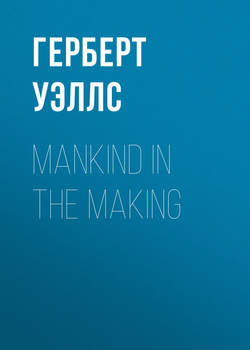Читать книгу Mankind in the Making - Герберт Уэллс, Герберт Джордж Уэллс - Страница 1
PREFACE
ОглавлениеIt may save misunderstanding if a word or so be said here of the aim and scope of this book. It is written in relation to a previous work, Anticipations, [Footnote: Published by Harper Bros.] and together with that and a small pamphlet, “The Discovery of the Future,” [Footnote: Nature, vol. lxv. (1901-2), p. 326, and reprinted in the Smithsonian Report for 1902] presents a general theory of social development and of social and political conduct. It is an attempt to deal with social and political questions in a new way and from a new starting-point, viewing the whole social and political world as aspects of one universal evolving scheme, and placing all social and political activities in a defined relation to that; and to this general method and trend it is that the attention of the reader is especially directed. The two books and the pamphlet together are to be regarded as an essay in presentation. It is a work that the writer admits he has undertaken primarily for his own mental comfort. He is remarkably not qualified to assume an authoritative tone in these matters, and he is acutely aware of the many defects in detailed knowledge, in temper, and in training these papers collectively display. He is aware that at such points, for example, as the reference to authorities in the chapter on the biological problem, and to books in the educational chapter, the lacunar quality of his reading and knowledge is only too evident; to fill in and complete his design – notably in the fourth paper – he has had quite frankly to jerry-build here and there. Nevertheless, he ventures to publish this book. There are phases in the development of every science when an incautious outsider may think himself almost necessary, when sketchiness ceases to be a sin, when the mere facts of irresponsibility and an untrained interest may permit a freshness, a freedom of mental gesture that would be inconvenient and compromising for the specialist; and such a phase, it is submitted, has been reached in this field of speculation. Moreover, the work attempted is not so much special and technical as a work of reconciliation, the suggestion of broad generalizations upon which divergent specialists may meet, a business for non-technical expression, and in which a man who knows a little of biology, a little of physical science, and a little in a practical way of social stratification, who has concerned himself with education and aspired to creative art, may claim in his very amateurishness a special qualification. And in addition, it is particularly a business for some irresponsible writer, outside the complications of practical politics, some man who, politically, “doesn’t matter,” to provide the first tentatives of a political doctrine that shall be equally available for application in the British Empire and in the United States. To that we must come, unless our talk of co-operation, of reunion, is no more than sentimental dreaming. We have to get into line, and that we cannot do while over here and over there men hold themselves bound by old party formulae, by loyalties and institutions, that are becoming, that have become, provincial in proportion to our new and wider needs. My instances are commonly British, but all the broad project of this book – the discussion of the quality of the average birth and of the average home, the educational scheme, the suggestions for the organization of literature and a common language, the criticism of polling and the jury system, and the ideal of a Republic with an apparatus of honour – is, I submit, addressed to, and could be adopted by, any English-reading and English-speaking man. No doubt the spirit of the inquiry is more British than American, that the abandonment of Rousseau and anarchic democracy is more complete than American thought is yet prepared for, but that is a difference not of quality but of degree. And even the appendix, which at a hasty glance may seem to be no more than the discussion of British parochial boundaries, does indeed develop principles of primary importance in the fundamental schism of American politics between the local State government and the central power. So much of apology and explanation I owe to the reader, to the contemporary specialist, and to myself.
These papers were first published in the British Fortnightly Review and in the American Cosmopolitan. In the latter periodical they were, for the most part, printed from uncorrected proofs set up from an early version. This periodical publication produced a considerable correspondence, which has been of very great service in the final revision. These papers have indeed been honoured by letters from men and women of almost every profession, and by a really very considerable amount of genuine criticism in the British press. Nothing, I think, could witness more effectually to the demand for such discussions of general principle, to the need felt for some nuclear matter to crystallize upon at the present time, however poor its quality, than this fact. Here I can only thank the writers collectively, and call their attention to the more practical gratitude of my frequently modified text.
I would, however, like to express my especial indebtedness to my friend, Mr. Graham Wallas, who generously toiled through the whole of my typewritten copy, and gave me much valuable advice, and to Mr. C. G. Stuart Menteath for some valuable references.
H. G. WELLS.
SANDGATE, July, 1903.
